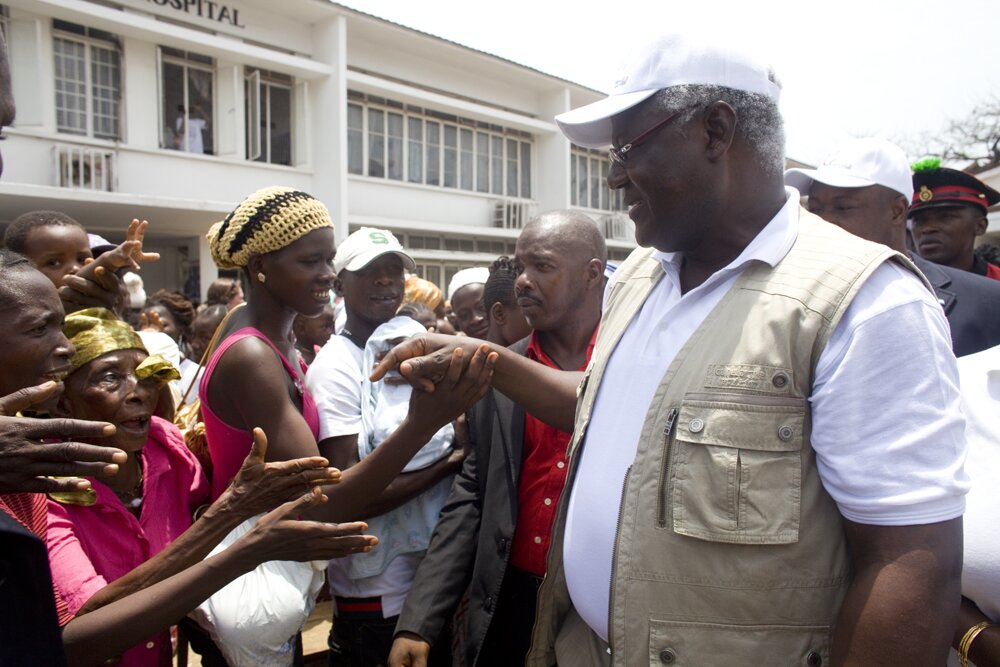President Koroma’s political will: “We have a great potential out there and Sierra Leone will transform itself”
 President Ernest Bai Koroma Photo Credit Dominic Chavez |
Political will is said to be able to move mountains, bringing about unlikely reforms in countries desperately needing them. Sierra Leone’s President Ernest Bai Koroma is a prime example of this phenomenon. In power since 2007, Koroma fought skeptical donors to bring free health care to pregnant and lactating women and children under five in Sierra Leone after a 1 in 8 maternal mortality rate created a human rights emergency. While the system is not yet perfect, preliminary results have pointed to more women and children getting the life-saving treatment they need.
However, Koroma has not stopped his reforms at health as is evidenced in a recent CNN interview where he shared his ambitious vision for his country. “In the next 50 years, we are not only going to transform ourselves from a low-income country, but we will get ourselves to the level of middle-income country and by the next 50 years, Sierra Leone will be a donor nation rather than a recipient nation.”
Koroma’s bold statement is not an empty promise, but strongly backed up by his development agenda, “We call it in Sierra Leone, the Agenda for Change. And (in) that agenda we have energy, agriculture, infrastructure, health and education as the key sectors that should be given a priority and attention.”
The implementation of the Agenda for Change can be seen in numerous projects currently on-going in the country with one being the Bumbuna Hydroelectric project. 30 years in the making, the project was at a standstill during the 10 year civil war which left the country with just 10 megawatts of energy. Now, under Koroma’s leadership, the Bumbuna project has been completed and the effects are already being felt.
Koroma added that citizens, “…have increased their domestic and economic activities because of a constant energy generation and they know that at the end of the day, ‘if I pay my bills, I will continue to enjoy the supply and if I enjoy the supply, I will be able to provide the services that will provide me an income,' so I think it is a win-win situation.”
With the gains of more reliable electricity, Koroma has his eye on building back the basic infrastructure destroyed during the 10 year civil war which ended in 2002. “The road network will be up and about; we'll be landing a fiber optic cable by next month and it will enhance our communication; educational sectors are now going through a reform process and we will continue to provide leadership and Sierra Leone will be completely different in the next 10 years.”
The fiber optic cable, an undersea telecommunications cable, that Koroma references indeed landed in early October and connects Sierra Leone and other countries along West Africa to Europe. Currently Sierra Leone has only 6% Internet coverage and 35% mobile phone coverage; all of which are provided by slow, expensive, and unreliable satellite connections. The World Bank estimates that bandwidth in Sierra Leone costs 25 times more than the U.S. price. The fiber optic cable can change all this and more as numerous studies have found that cheap and fast Internet can boost a country's economic growth.
While the fiber optic cable will not be operational until 2012, there is a feeling that Sierra Leone is well on its way to the complete transformation President Koroma told CNN about.
“I believe with these gains we have made, we are not going to rest, we are going to continue to press on and Sierra Leone will be the place for investment opportunities. And with that, I'm sure within the next 10 years, Sierra Leone will be completely different,” Koroma said. “We have had our difficult past and we don't want to stick on the past. We want to focus on the future. We have opportunities, we have a great potential out there and Sierra Leone will transform itself.”
Keyword Search
MLI works with ministries of health to advance country ownership and leadership. This blog covers issues affecting the ministries and the people they serve.
Connect with Us
![]()
![]()
Categories
Blogs We Like
- Africa Can End Poverty
- Africa Governance Initiative
- Behind the Numbers
- CapacityPlus
- Center for Global Health R&D Policy Assessment
- Center for Global Development: Global Health Policy
- Center for Health Market Innovations
- Global Health
- Global Health Hub
- Global Health Impact
- The New Security Beat
- PAI Blog
- RH Reality Check
- Save the Children
- Transparency and Accountability Program
Contact Us
Please direct all inquiries to
